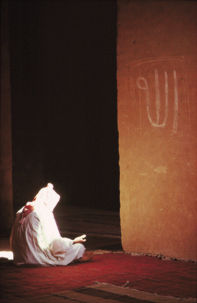So....day 24 of Ramadhan 1427....well into the last 10 days of Ramadhan....subhanAllah...that feeling of sadness gradually creeping up on us as we try and make the most of what we have left, not knowing whether we will be alive to see it thru and be blessed enough to see the next.
For many this Ramadhan has been a time for change, a time for reflection, contemplation, and soul searching....changing ourselves, begging for forgiveness, and hoping our fasts were kept with pure intention and are accepted along side our ibadah by Allah (SWT). Many still in hope that mercy, and forgiveness may still be bestilled upon us...before the shayateen are let loose and the muslim community once again disperses for another year, as the masjids stand empty 6 days out of 7. In hope these chages are truly going to last for the next 11 months atlest!
For others, who are looking forward to Eid, and the copious amount of food, free mixing and entertainment, the freedom to go to the cinema, and do all that is haram for the body and the nafs in this life and the akhirra....did you truly understand the concept of Ramadhan, do you truly understand the power of Allah (swt), or have you become blind to the beauty of the deen that has been given to you ...the guidance that is clearly prescribed for you??? All to fulfil your worldly desires, succumb to shaytaan, and feed your nafs all it desires....
MUSLIMS!!!!
Yes, you!
Watch out....the clock is ticking, there is little time left, as another blessed Ramadhan passes us by? Have you done enough, should you die tomorrow? Are you happy with the way you have reformed your characer? Have you removed your bad traits and begged for forgiveness?
Noone....not one of you, can truly say you have done enough....and I for one, put myself at the top of the list! But what are we going to do about it? Wait in awe of Eid, or get down on our knees, hold our hands in dua'a, recite Quran, in hope of some salvation....
Before it's too late....
The poem below is written by myslef....in hope it will make you think and reflect inshaAllah before Ramadhan passes us by, and we succumb to shaytan, our nafs, and worldly desires...
May Allah swt have mercy on us, accept our actions, and distance us from our sins, and the lure of our rotten nafs
Ameen.
Dunya vs. Akhirra...
"Rivalry in worldly increase distracteth you, Until ye come to the graves.Nay, but ye will come to know!Nay, but ye will come to know!Nay, would that ye knew (now) with a sure knowledge!For ye will behold hell-fire.Aye, ye will behold it with sure vision.Then, on that day, ye will be asked concerning pleasure."
(Surah At Takathur)
You have this great plan, of how you want your life to be;
Planning for the dunya, when only He can but foresee.
Studying, working, purchasing, a brand new house or car;
In this wild delusion that this world may take you far.
Distracted from your duties, never mindful of your death,
Not knowing when or where, you might take your last few breaths.
Every day taken for granted, every hour wasted in awe,
Materialistic dunya, ungrateful servants wanting more.
You all manage to fast okay, practice the hunger and the thirst;
Turning your backs then to backbite, envy, hate or worse.
Once a year, in Ramadhan, you all try to do more;
As soon as Eid ul fitr comes, Islam goes out the door.
In a place where there’s no wealth except your deeds, both good and bad;
What use is all this money, when you wasted what you had?
You never spent in Allah’s cause, for fear of poverty;
You embraced the dunya, forgot about Eternity.
When you see, all those you wronged, take the few good deeds you had;
When you see that all your wealth you’ll leave behind, will you be glad?
On the final day of reckoning, when you stand before Allah,
Will you be sent to Hell, or granted access to Jannah?
What’s going on O Muslims? Why do you think that you;
Might escape the punishment, no matter what you do.
The End is but inevitable, the grave your place of rest,
Even the rich amongst you, will have to pass the test.
Control of your Nafs, Purifying your intention,
Don’t let the Shayatin, give bad deeds even a mention.
Live each day as it’s your last, don’t withhold enmity,
Forgive and forget, in hope of pure serenity.
Take heed today o Muslims, and be thankful to Allah;
Turn and Repent, Help others, give Zakah.
Be mindful of your speech, be grateful of your health
Read Quran and Salaah, for truly they will be your wealth.
Soul Scripture, Ramadhan 1427








